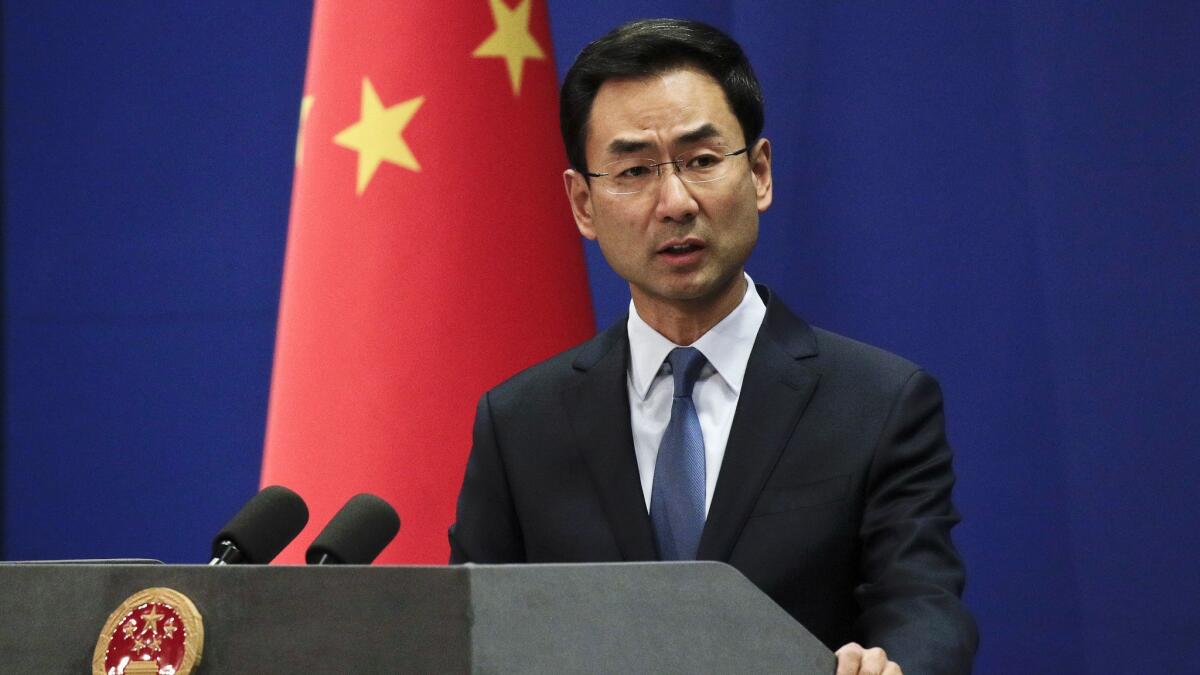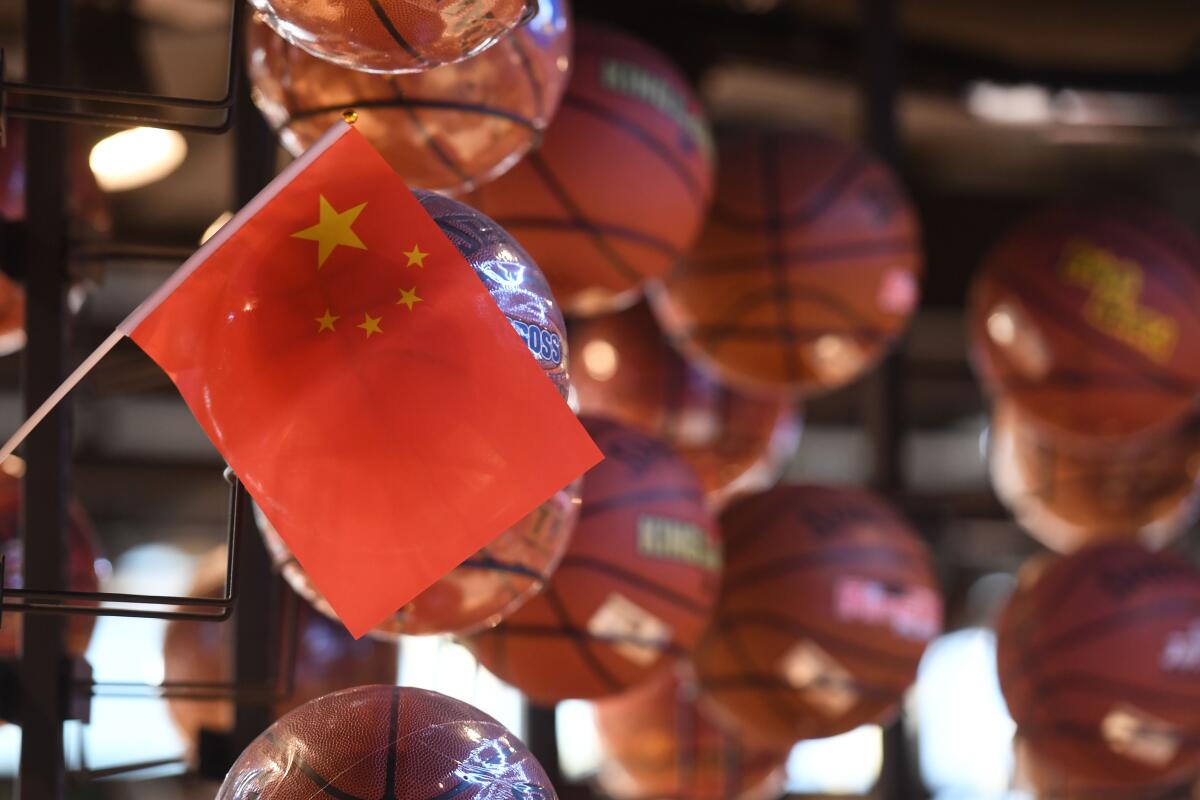U.S. hits China over human rights. Beijing says it’s just a distraction from NBA, trade talks

Why would the United States blacklist a Chinese police station? What do law enforcement figures in the region of Xinjiang have to do with trade?
Such questions rippled across Chinese social media this week as the U.S. Commerce Department added 28 Chinese companies and public security bureaus to a list of entities barred from making purchases from U.S. companies without special approval.
The list includes eight high-tech companies that provide China’s top artificial intelligence and surveillance services, such as Hikvision, SenseTime and IFlytek, along with the public security bureau and 19 related government agencies in the northwestern region of Xinjiang. The move comes as the U.S. and China prepare for another round of trade negotiations this week and as the rift between China and the NBA continues to widen.
The steps mark the first serious action the U.S. has taken to penalize Chinese entities for human rights violations they say include mass incarceration and high-technology surveillance of Uighurs, Kazakhs and other Muslim minorities in Xinjiang.
On Tuesday, the State Department said it would also stop issuing visas to Chinese government and Communist Party officials believed to be responsible for or complicit in the detentions and surveillance of Muslims in Xinjiang.
Both measures are unprecedented steps lauded by human rights advocates as the first concrete actions taken by any country since the plight of at least a million forcibly detained Muslims, according to the United Nations, became public knowledge two years ago.
But in China, where state media has framed the government’s actions in Xinjiang as benevolent and necessary counter-terrorism and development projects, officials rejected the U.S. actions as “made up pretexts” for interference.
“The U.S. criticism is nothing more than fact-distorting gibberish, which only further reveals the country’s malicious intention to impede the counter-terrorism efforts in Xinjiang and stability and development of China,” said Ministry of Foreign Affairs spokesperson Geng Shuang at a news briefing Tuesday.
State propaganda seems to have so successfully obfuscated China’s policies toward Muslim minorities that some Chinese social media users expressed bewilderment over why the United States was even targeting Xinjiang’s security forces.
“The whole thing seems so weird to me,” wrote a user named “I’d Like to be Rich 666” on the state-censored social media platform Weibo. “Can someone tell me what Xinjiang’s public security bureau has done internationally to attract the attention of the Department of Commerce?”
The human rights actions are likely to ratchet up tensions as trade negotiations with China get underway Thursday in Washington.
The chances of a deal are low, as U.S.-China tensions grow over protests in Hong Kong, the blackout of NBA games and human rights violations in Xinjiang -- issues which extend beyond business complaints like intellectual property protection and market access, and touch on the very sovereignty of the Communist Party.

| The Chinese flag is seen with a display of basketballs in the NBA store in Beijing this week. |
“In trade issues, China is willing to give in ... to decrease the trade deficit, protect IP, increase market opening,” said Wang Yong, director of Peking University’s Center for Political Economy. “But in political and national issues, those that infringe on Chinese sovereignty -- China is not going to give in.”
While U.S. officials said the blacklistings and visa restrictions are not related to trade talks, they are being read as such in Beijing.
“Look at this timing. You could have announced this decision before or after, but to do it right when [Vice Premier] Liu He is heading to the U.S. -- this is not a coincidence. This is a way of exerting pressure,” said Song Guoyou, deputy director of the Center for American Studies at Fudan University in Shanghai.
From China’s perspective, the Trump administration is just drumming up new excuses to cover the U.S. aim of competing with Chinese technology, he added.
“No matter the name -- national security, human rights, environmental protection, blah, blah, blah -- the fundamental aim is quite clear: to set some limitations for China’s high-tech company development,” Song said.
It doesn’t help that the U.S. has been inconsistent in taking any bold action on international human rights protections, often ignoring serious violations when they are committed by U.S. allies that serve U.S. energy and commercial interests.
“The Xinjiang problem -- the so-called surveillance assisted by Chinese companies -- is just an excuse,” Wang said. “This is all American hawks, America’s far right trying to contain China.”
If no deal is made this week, another increase in U.S. tariffs on China is set to take effect Tuesday. An existing 25% duty on $250 billion worth of Chinese goods will be raised to 30%.
One way out for the Chinese could be to wait out the U.S. elections to see if Trump is bounced from office, or at least changes tactics with China.
Wang said the U.S. commitment to human rights was disingenuous and could potentially be dropped as a bargaining chip in trade negotiations, easily given up if Trump urgently needs a trade deal to boost his electoral chances.
“He gets credit for being tough on China at this moment,” Wang said. “He’ll only be thinking about elections later. He has to say, ‘I win!’
“When he’s in a crisis, economic or personal, he may come to China and say, ‘Let’s make a deal,’” Wang said.
More to Read
Start your day right
Sign up for Essential California for news, features and recommendations from the L.A. Times and beyond in your inbox six days a week.
You may occasionally receive promotional content from the Los Angeles Times.







